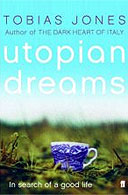
Utopian Dreams: A Search for a Better Life
by Tobias Jones
220pp, Faber, £12.99
Tobias Jones describes himself as a travel writer, although he never ventures too far from home. He wrote his first book, The Dark Heart of Italy, when he went to live in Parma and found himself appalled by the seamy realities of Italian life. Other people might have been impressed, amused or even envious of the way that Italians tolerate their own deceptions and hypocrisies, but Jones was outraged.
The same sense of self-righteous fury permeates his second book, which opens with 20 pages of rambling disquiet at the follies and fripperies of the modern world. Admitting that he's a bit of a young fogey, Jones complains about consumerism, globalisation, litter on pavements, late-night traffic, those brash advertising hoardings on rugby pitches ... Just when this is beginning to sound like the un-stoppable rantings of some red-faced old major with a tightly rolled copy of the Daily Telegraph tucked under his arm, Jones offers something more interesting.
Along with more than half his friends and relatives, he says, he's been on anti-depressants. Intriguingly, unfashionably, he's a committed Christian. And now, confused and homeless, accompanied by his wife and their baby, he has decided to spend a year living in self-contained communities, searching for something, although he isn't quite sure what. All he has is an intuition that "those living together, subject to common rules, enjoyed a freedom which lonely isolationists could only dream of".
He starts his search in Damanhar, a village 30 miles north of Turin, where a messianic figure called Falcon has founded a New Age community based on what he experienced when he travelled 6,000 years back in time. They have their own currency, their own flag, their own shops and factories, and each of the residents is given their own silly name (Goat, Crab, Vulture). They believe in alchemy. At the annual sports day, there's a telepathy competition.
From there, Jones soon flees south to Tuscany and then Sicily, before leaping back to England. He visits Quaker bungalows, Catholic foster parents and farms built on confiscated Mafia land where recovering drug addicts press premium olive oil. Although the red-faced major makes an occasional reappearance, Jones is usually a tolerant, open-minded and generous witness, giving concise and acutely observed descriptions of the communities that he visits.
Everywhere, he finds elements to admire or condemn, but he doesn't feel passionately about any particular place until he reaches Pilsdon in Dorset, a Christian community which welcomes "wayfarers" - tramps and drifters - alongside anyone trying to put their life back together and overcome addiction or trauma.
Pilsdon was founded by a Church of England clergyman, who described it as a "school for sinners". Bells ring throughout the day, announcing meals and services. Priests and nuns form the backbone of the staff. There's no need to be a believer, although an atmosphere of "undercover Christianity" fills the place. Here, Jones finds a community that he admires, even loves, and where he can be happy.
Around 20 or 30 people live in a 17th-century farmhouse, sharing daily tasks, milking the cows, ploughing the fields, working together. Some people stay a night, while others have been there for decades. There seem to be only a couple of rules: you have to work and you have to stay sober.
Contentment does come at a price: Jones also discovers the real cost of living with others. "At the beginning of this trip I thought living in community would be tough because you're living cheek by jowl with people you might have little in common with, people who you wouldn't necessarily choose as friends ... But the true difficulty of living here is that there's nowhere to hide. The place holds a mirror up to yourself and shows you what you're really like." I wanted to know what he saw in the mirror, but he keeps that to himself.
When Jones offers his own definition of a perfect community, he describes a place which sounds pretty much like Pilsdon. It will be a group of between 15 and 25 people. They will be self-sufficient and often silent. They'll have to have "a full-size snooker table, a chess set, a library, a football pitch and a piano". Most importantly, they will share a common belief, a shared purpose, one faith - "something for which one is prepared to give one's heart".
By the end of the book, Jones has finally decided what he's been looking for. It's not a house, a plot of land or a group of people. It's just a place where he can express his faith and live according to his beliefs. He and his wife decide to stop travelling - "rather a daft decision for a travel writer" - and settle in Bristol. On a map, they draw a circle with a radius of one mile, the bullseye being their own red front door. "We were, in some way, responsible for everything inside that tiny community." And that's where he ends his journey: pacing the circumference of his self-appointed community, staring at the city. It's an intriguing, frustrating place to end a journey, more like a pause than a conclusion, and left me eager to know what happened next. Perhaps that will be the subject of his third book.

